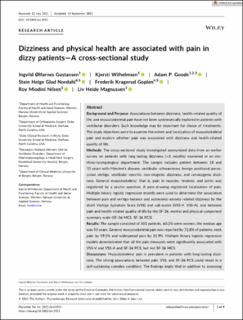Dizziness and physical health are associated with pain in dizzy patients—A cross‐sectional study
Gustavsen, Ingvild Ølfarnes; Wilhelmsen, Kjersti; Goode, Adam P.; Nordahl, Stein Helge Glad; Goplen, Frederik Kragerud; Nilsen, Roy Miodini; Magnussen, Liv Heide
Journal article, Peer reviewed
Published version

Åpne
Permanent lenke
https://hdl.handle.net/11250/2799939Utgivelsesdato
2021Metadata
Vis full innførselSamlinger
- Department of Clinical Medicine [2066]
- Registrations from Cristin [9791]
Sammendrag
Background and Purpose
Associations between dizziness, health-related quality of life, and musculoskeletal pain have not been systematically explored in patients with vestibular disorders. Such knowledge may be important for choice of treatments. The study objectives were to examine the extent and localization of musculoskeletal pain and explore whether pain was associated with dizziness and health-related quality of life.
Methods
The cross-sectional study investigated anonymized data from an earlier survey on patients with long-lasting dizziness (>3 months) examined in an oto-rhino-laryngological department. The sample includes patient between 18 and 70 years with Ménière's disease, vestibular schwannoma, benign positional paroxysmal vertigo, vestibular neuritis, non-otogenic dizziness, and cervicogenic dizziness. General musculoskeletal, that is, pain in muscles, tendons, and joints was registered by a yes/no question. A pain drawing registered localization of pain. Multiple binary logistic regression models were used to determine the association between pain and vertigo-balance and autonomic-anxiety related dizziness by the short Vertigo Symptom Scale (VSS) and sub-scales (VSS-V, VSS-A), and between pain and health-related quality of life by the SF-36, mental and physical component summary scale (SF-36 MCS, SF-36 PCS).
Results
The sample consisted of 503 patients, 60.2% were women, the median age was 50 years. General musculoskeletal pain was reported by 72.8% of patients, neck pain by 59.2% and widespread pain by 21.9%. Multiple binary logistic regression models demonstrated that all the pain measures were significantly associated with VSS-V and VSS-A and SF-36 PCS, but not SF-36 MCS.
Discussions
Musculoskeletal pain is prevalent in patients with long-lasting dizziness. The strong associations between pain, VSS, and SF-36 PCS could result in a self-sustaining complex condition. The findings imply that in addition to assessing and treating the vestibular symptoms, musculoskeletal symptoms and physical health should be addressed.
